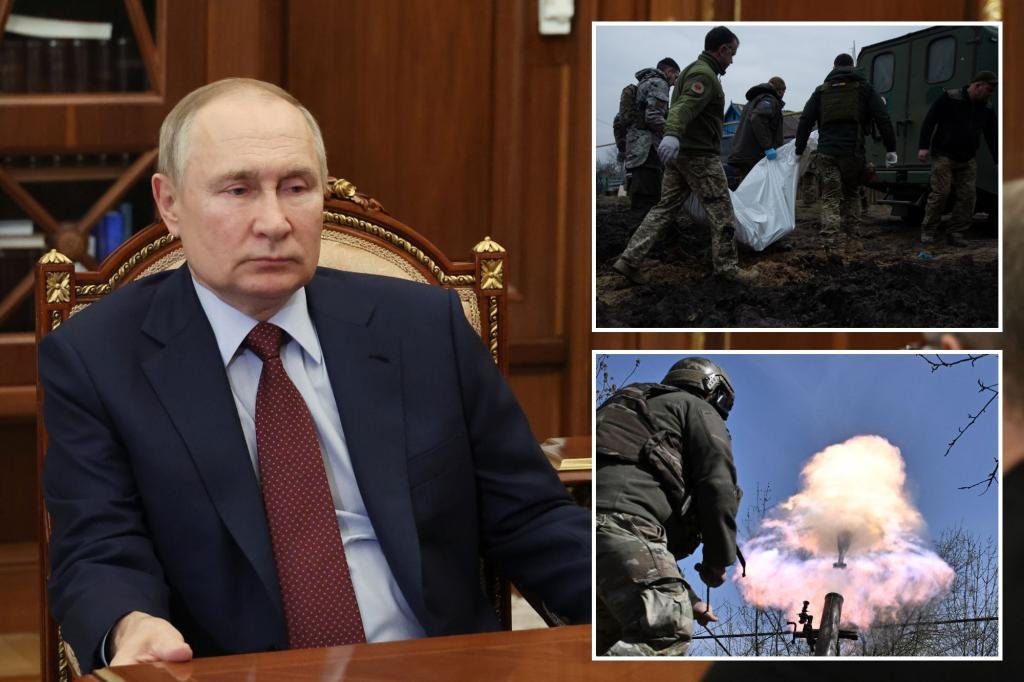Putin’s hybrid warfare diverts Western attention and resources from Ukraine
If America wants to end the Ukraine war, the first step is to see the conflict through the Kremlin’s eyes.
Russian President Vladimir Putin’s tanks and jets might not be powerful, but his hybrid-warfare tools are potent enough to exploit tensions around Europe, including in Georgia, Moldova and the Western Balkans.
Despite Russia’s poor military performance in Ukraine, Putin still has numerous devices at his disposal he’s used to destabilize and divert Western attention and resources from Ukraine.
While Russia’s nuclear weapons are visible, the strongman has also been waging a silent and invisible war weaponizing energy, refugees and information to undermine the West.
Russia’s foreign-intelligence chief, Sergey Naryshkin, last week accused the West of trying to open a “second front” against Moscow in Georgia.
This came after Russian officials seemed particularly disappointed by the Georgian government’s failure to withstand public pressure and implement a foreign-agents law.
After Georgia’s Parliament passed a bill on “Transparency of Foreign Influence,” a wave of unprecedented anger rippled across the country, prompting even the more apathetic segments of society to march into the streets of Tbilisi.

Waving European Union and Georgian flags, tens of thousands of protesters chanted, “No to the Russian law.”
Pro-European Georgians are angry because the proposed legislation resembles the 2012 Russian foreign-agents law Putin has used to crack down on the media and civil society.
And European leaders have emphasized the law would harm Georgia’s prospects of getting EU candidacy status.
Russian Foreign Minister Sergey Lavrov accused the West of orchestrating another colored revolution scenario, while state-media RT head Margarita Simonyan claimed the protesters wanted to open a second front of conflict against Russia.
Moscow’s diplomatic Twitter account in Crimea went so far as to threaten Georgia with another war.
Any political decision to isolate Georgia from the West would be a victory for Russia, as Tbilisi’s already-complex security situation would become even more fragile.
Putin also has his eyes on Moldova. The Russian defense ministry accused Ukraine in late February of plotting an armed provocation in Transnistria (the slice of Moldova that Russia “inspired” to declare independence two decades ago); President Maia Sandu declared Moscow had plots to overthrow the government and reverse Moldova’s EU aspirations.

Moldova achieved outstanding success last year when it received EU candidacy status. The Kremlin sees Moldova’s pro-EU government as a threat to its regional influence.
Sandu’s statement exposed a set of sabotage operations Russia was hoping to conduct.
In March, dozens took to the streets to join the protests pro-Russian opposition politician Ilan Shor orchestrated.
The Kremlin has capitalized on grievances that have intensified since the government decided to cut Russian energy supplies.
Such incidents remind one of Georgia and Ukraine — where Russia has also used local actors to create chaos and destabilization.
The Western Balkans is another theater for Moscow’s games, and Putin has been using a similar playbook.
Kosovo’s president revealed Russia is using mercenaries from the infamous Wagner Group and Serbian paramilitary groups to unleash destruction in Kosovo and possibly seize territory.
As Serbia and Kosovo are in US- and EU-led normalization talks, Serbia’s pro-Russian nationalist groups are organizing protests accusing the country’s leadership of being in the process of formally recognizing Kosovo.

In Serbia, Putin has maintained high degrees of influence through institutions like the Serbian Orthodox Church and media. Sputnik News channel has been operating in Belgrade for several years; Moscow recently also opened state-media channel RT.
In Bosnia, Russia has been amplifying secessionist rhetoric from pro-Kremlin Bosnian Serb leader Milorad Dodik, who announced his intention to pass a foreign-agents law.
In Montenegro, Russia has used the Serbian Orthodox Church to foment instability, targeting Serbs there, by polarizing the country and undermining NATO.
As Russia’s losses in Ukraine continue to grow, the Kremlin will keep using asymmetric means of challenging and distracting the West with Georgia, Moldova and the Western Balkans as another battlefield.
While much of the American attention is focused on operational development on the ground, Russia’s military doctrine relies on hybrid warfare to execute its political and military objectives.
Only once the West understands this can it begin to craft effective countermeasures to oppose the Kremlin and its geopolitical ambitions.
Ivana Stradner is a research fellow at the Foundation for Defense of Democracies. Natia Seskuria is founder and executive director of the Regional Institute for Security Studies in Georgia and a fellow at RUSI, UK.




